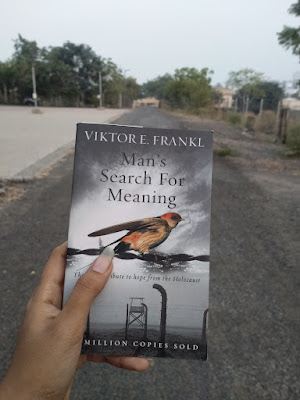In Lord Byron's "Child Harold Pilgrimage," he asserts, "The great object of life is sensation - to feel that we exist, even though in pain," which echoes Percy Shelley's notion that "Our sweetest songs are those that tell of saddest thought."
"Man's Search for Meaning" is a book written in 1946 by Viktor Frankl. It tells the story of his time as a prisoner in Nazi concentration camps during World War II. In the book, he talks about a way to find meaning in life, even in difficult situations. He suggests that finding purpose can come from doing tasks, caring for others, or facing challenges with dignity.
The inmate's mental reaction can be observed in three distinct phases: admission, routine, and release. Around fifteen hundred captives were confined. The narrator encountered prisoners who appeared content, connecting this demeanor to a "delusion of reprieve." There lingered hope until the last moment, a belief that things wouldn't turn bleak.
The narrator, a psychiatrist, employed direct narration, making the book more relatable as readers felt personally addressed. Prisoners arriving underwent various tests; those deemed unfit for labor due to illness were directed left by the SS men to a place labeled as "bath" in multiple languages, a deceptive term for their eventual murder. Those who passed these trials progressed to the next stage but were allowed to keep nothing besides their shoes.
Their survival tactics contradicted textbooks; enduring the harshest conditions, they went months without brushing their teeth or changing clothes, sharing two blankets among nine people. Some even attempted suicide by touching bare electrical wires. Dr. M suggested appearing youthful and energetic to secure work and thus survive. The narrative showcases the prisoners' resilience amidst hardships and the grim reality of their situation.
In the second phase, they achieved emotional death—longing for family and home, disgust for their surroundings. The horrific and disgusting work of new employees made the story more heart-wrenching. "Disgust, horror, and pity are emotions that our spectator could not really feel anymore." These lines showcase the brutality of officers or anyone appointed for duty.
Looking younger is the only way of living; any symptoms of illness would lead to being gassed. "A man who looks miserable, down and out, sick and emaciated, and who cannot manage hard physical labor" is known as Moslem. Officers, for instance, treated prisoners as animals or beasts, calling them 'pig.' The voicelessness and inability of prisoners in agency led to this kind of behavior.
Moreover, they used passwords such as "The guard is coming" for warning. During their scarce free time for mealtime or sleeping, they talked about "Food." At the high point, most of the prisoners nearly looked like skeletons. Another emphasis was on debates prevalent in the camp known as "Cultural hibernation." Prisoners often debated politics and religion, and from his observation, the narrator points out that spirituality and religion helped people survive.
Soon they found a ray of hope. The narrator gained immense energy, and there were now small gatherings where prisoners pursued humor, art, singing, and more, of course, without attracting officers. "Humor was another of the soul's weapons in the fight for self-preservation." The prisoners' lives were like a "provisional existence of unknown limits."
"Suffering is omnipresent," and consequently, prisoners lost the feeling of being an individual. The field of trauma studies in literary criticism gained significant attention in 1996 with the publication of Cathy Caruth's "Unclaimed Experience: Trauma, Narrative, and History" and Kali Tal's "Worlds of Hurt: Reading the Literatures of Trauma." Loss of identity is a peak in which an individual goes through an identity crisis and his space in society. Similarly, all the prisoners suffered from that.
Additionally, their monotonous life and considering themselves as sheep made them mere puppets of masters. This relationship turned into an inferiority complex where victims felt themselves inferior to their authority. For instance, dehumanization of prisoners made them just "Number."
"Is man but an accidental product of these?"
The narrator said we have the choice of making decisions, "a decision which determined whether you would or would not submit to those powers." A free spirit and connection with the inner self could only help in surviving in the camp. In particular, uniqueness or singleness is a factor that makes individuals different and provides meaning to their lives.
Nietzsche's words, "He who has a Why to live for can bear with almost any How." The third stage, the psychology of the prisoner after liberation. The psychological makeup of the guard was sadist and cynical. They witnessed brutal tortures for years, and it made them like this. On liberation, the narrator said, "we wanted to see the camp's surroundings for the first time with the eyes of a free man." Not only did they get "freedom" but also a sense of feelings which were not there throughout the camp. However, there was a sense of "depersonalization," which means their minds lost the same pleasure and feelings which were there earlier.
Additionally, they ate and talked a lot; their suppressed deeds were coming out. This is the reaction of the camp's trauma that changed their whole identity. Some of them became oppressors, which is a consequence of long oppression. Many times, long suppression outburst and resulted in being an oppressor. Bitterness and disillusionment accompany the libertines. These are all outcomes revealing the result of torture and trauma in an individual's life.
In the later chapters of the book, the author gave the theory of "Logotherapy." In which he talked about existential frustration, "existential vacuum," which is the result of conformism and totalitarianism. Moreover, he also shed light upon the meaning of suffering, pre-determinism, and psychiatry rehumanized.
"After all, man is that being who invented gas chambers of Auschwitz; however, he is also that being who entered those gas chambers upright."
Victor E Frankl:
Professor of Neurology and Psychiatry, founder of "Third Viennese school of Psychotherapy", and Logotherapy.
Thank you.

No comments:
Post a Comment